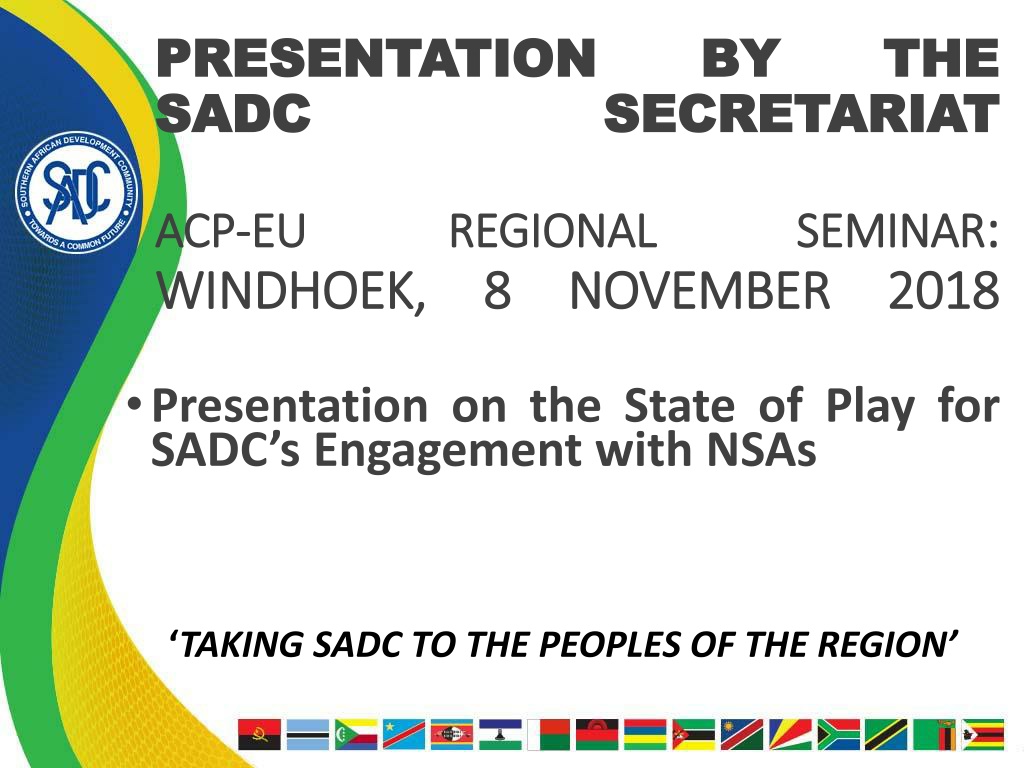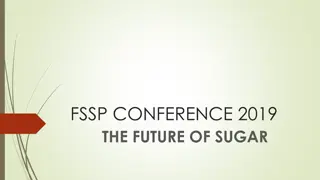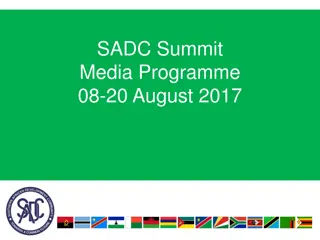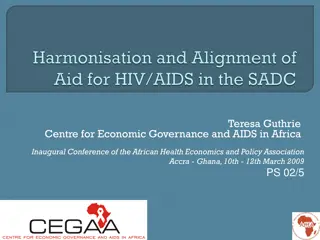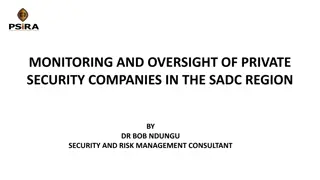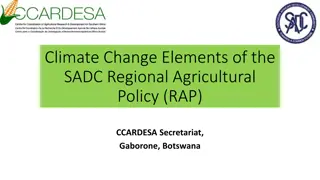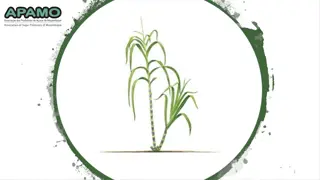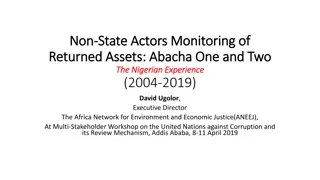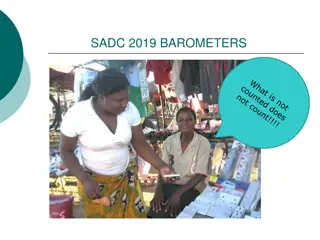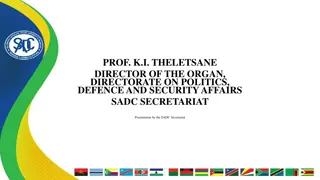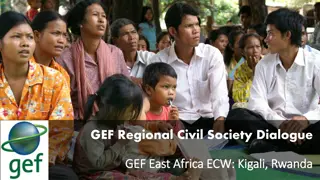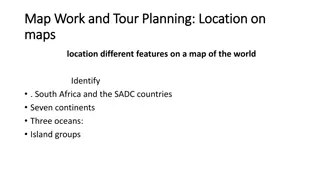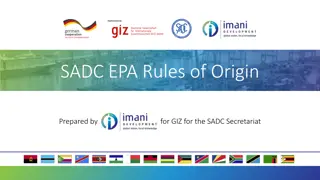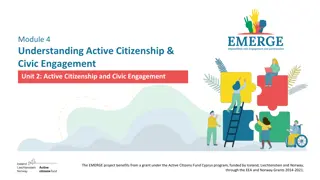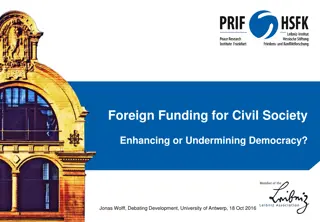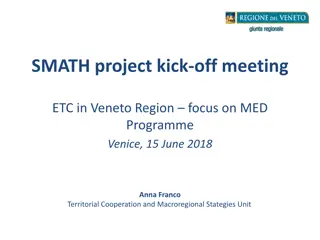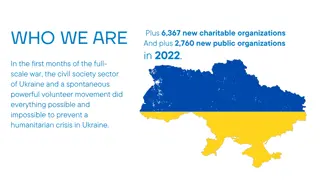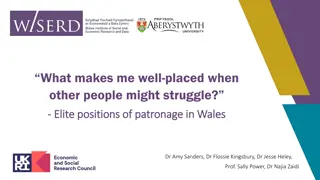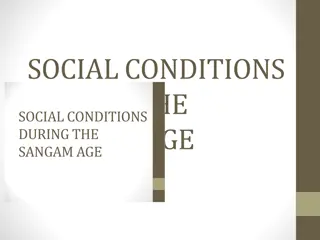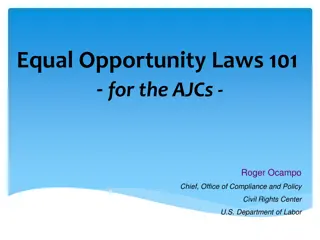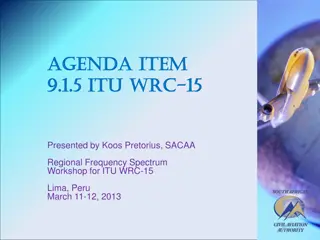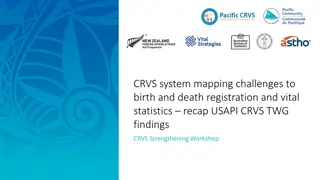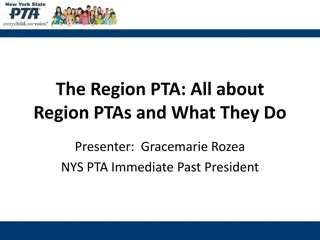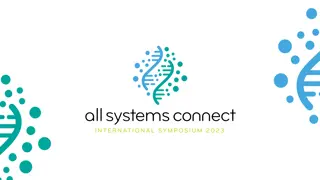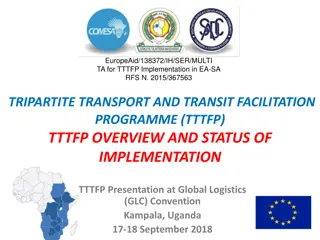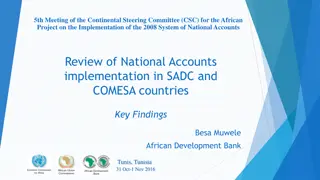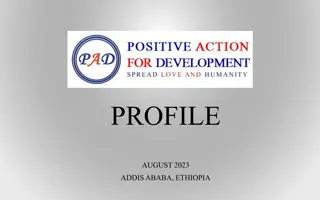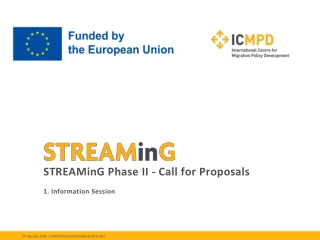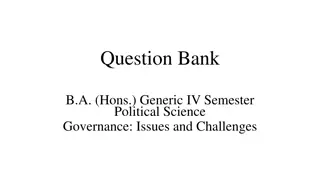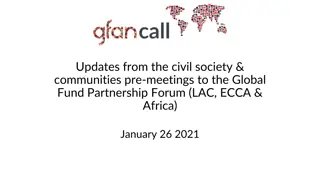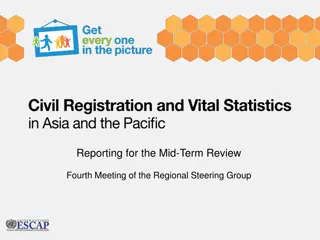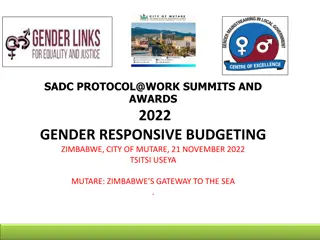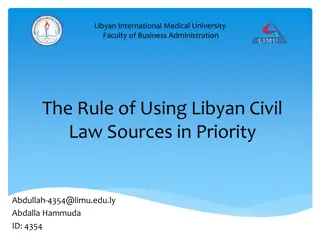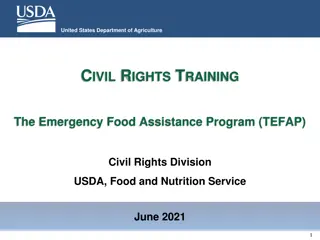Enhancing Civil Society Engagement in SADC Region
Exploring the State of Play for SADC's Engagement with Non-State Actors (NSAs) during the ACP-EU Seminar in Windhoek. The presentation highlights the importance of strengthening partnerships with civil society organizations to influence policy agendas for regional development.
Download Presentation

Please find below an Image/Link to download the presentation.
The content on the website is provided AS IS for your information and personal use only. It may not be sold, licensed, or shared on other websites without obtaining consent from the author. Download presentation by click this link. If you encounter any issues during the download, it is possible that the publisher has removed the file from their server.
E N D
Presentation Transcript
PRESENTATION PRESENTATION SADC SADC BY BY THE THE SECRETARIAT SECRETARIAT SEMINAR SEMINAR: : 2018 2018 ACP ACP- -EU WINDHOEK, WINDHOEK, EU REGIONAL REGIONAL 8 8 NOVEMBER NOVEMBER Presentation on the State of Play for SADC s Engagement with NSAs TAKING SADC TO THE PEOPLES OF THE REGION
Introductory Remarks Moderator of the Session President of the ACP-EU Follow-Up Committee The Head of the EU Delegation to Namibia President of the EU Economic and Social Committee External Relations Section Distinguished Ladies and Gentlemen Good morning. My name is Maxwell Mkumba, Senior Policy Advisor at the SADC Secretariat. It is an honour to join this great gathering as I humbly represent the Executive Secretary of SADC, Dr. Stergomena Lawrence Tax, who really wanted to be here with you in person. However, she is unable to do so because of other equally important prior commitments. Nevertheless, she wishes the 16thRegonal Seminar fruitful deliberations, as members deliberate on ways of strengthening partnerships for effective engagement in order to influence policy agenda in the global economic and social environments.
Introductory Remarks Before giving the synopsis of the state of play regarding civil society in the SADC region, let me mention that it is in the interest of SADC that we remain engaged with the Non-State Actors, including the Civil Society Organisations, as part of strengthening the SADC service delivery. It is for this reason that we have now started consistently attending the major events of the civil society formations, such as the Annual Civil Society Forum and other Civil Society engagements. During these events, we try as much as possible to engage with the civil society organisations, and respond to issues, especially with respect to the formalisation of the engagement processes through an established framework of what we Mechanism. call SADC Engagement
What is the SADC NSA Engagement Mechanism Some of you may ask, what is this Mechanisdm? Now, for the benefit of the Members, let me state that the origins of the need and mandate to develop a SADC Non- State Actors Engagement Mechanism are in the recognition that NSAs are important implementation of the SADC Agenda. stakeholders in the The recognition is enshrined in: (a) Articles 5(2b) of the SADC Treaty holds that SADC shall encourage the people of the Region and their institutions to take initiatives to develop economic, social and cultural ties across the region and to implementation of the programmes and projects of SADC. participate fully in the
Rationale for the NSA Mechanism (cnt d) (b) Article 23 of the Treaty also provides that SADC shall seek to fully involve the people of the Region and non- governmental organisations in the processes of regional integration. Further, SADC commits to cooperate with and support initiatives of the peoples of the region and non-governmental organisations in order to foster closer relations among the communities, associations and peoples of the region. (c) The SADC s development blueprint, the Revised Regional Indicative Strategic Development Plan (2015-2020), proposes a working relationship with NSAs and an annual consultation conference Secretariat and NSAs. between SADC
Rationale for the NSA Mechanism: Peace and Security Considerations (d) The Protocol on Politics, Defence and Security Cooperation outlines engagement with non-state parties and international organisations. the possibility of NSA (e) The SADC Indicative Plan for the Organ encourages cooperation with non-state parties and international Organisations and, where possible, cooperation agreements between State Parties and Non-State Parties on such matters as provided for in the Protocol on Politics, Cooperation. Defence and Security
ThenOther SADC Legal Instruments (f) Other SADC Protocols, Agreements, Strategies and Policies, including the Protocol on Trade; SADC Protocol on Mining; SADC Employment and Labour Protocol; the SADC Industrialisation Strategy and Roadmap; the SADC Agricultural Policy, etc., have various provisions for engaging the Non-State Actors. (g) Importantly, I should state that the SADC Windhoek Declaration of 2006 on SADC and ICPs, under Article 9, also commits SADC Member States to exercise leadership in developing, implementing and monitoring the regional development agenda through broad consultative processes (including the participation of civil society and the private sector) .
Summit Decisions on NSA Engagement (h) There are several Council Decisions and Summit Communiqu s that also emphasise the need for a more profound and mechanism. In particular, Council Decisions from: The Council Meeting of August 2004 in Grand Baie Council, in Mauritius; The Council Meeting of September 2009 in Kinshasa, the DRC; and The Council Meeting of August 2011 in Windhoek, Namibia, establishment of a formal and institutionalized mechanism. and Council Own effective engagement which directed the
The Draft Engagement Mechanism On the basis of these initiatives, the SADC Secretariat with support from one of the vibrant civil society organisations, the Southern Africa Trust, drafted the SADC Mechanism for Engagement with Non-State Actors. This Mechanism was formulated through extensive consultations, including consultations with CSOs, and was submitted to Council in March 2017, in Ezulwini, Swaziland. Council, after considering the draft Mechanism, directed that it should incorporate the issues of non-state actors in the area of Politics, Defence and Security Cooperation, an exercise that was necessary for submission of the draft Mechanism to the Ministerial Committee of the Organ.
Council Decision of March 2017 In order to effectively operationalize this principle and the directives by Council, the SADC Secretariat resolved to commission a study to inform the process. There was merit in the Decision of Council of Ministers. In order to meaningfully capture essence of the NSA engagement in the issues of peace and security, the Secretariat solicited, once again, the support of the Southern Africa Trust and, together a study was commissioned to cover these areas. The draft report was produced in December 2017, and has undergone internal reviews to ensure that there are no gaps.
Summary of the Findings The general findings of both the first and second studies we commissioned with the Southern Africa Trust, indicate that SADC has made progress in engaging civil society organisations, primarily at governance and policy programmes levels implementation). formulation (formulation and at and However, the main challenge is that SADC s engagement with NSAs is often ad hoc, and not undertaken in a well-coordinated Consequently, there is an engagement gap that exits in dealing with issues of SADC. manner.
Findings (recap) The two studies noted that the engagement between the SADC and NSAs is often taking place at the discretion of the Secretariat. NSAs have very little chance of engaging SADC policymakers in the SADC Council and Heads of State Summit Meetings directly. However, this assumes that SADC is equal to the Secretariat only. This is the myth which, moving forward, we need to untangle by placing emphasis on the fact that SADC is broad and, as such, effective engagement must also take place at the national levels as well. There are no identified rules of procedure for NSA participation, and few regular open, public hearings and consultations that enable NSAs to provide formal inputs and submissions to SADC (at both regional and national levels).
Findings (recap) NSAs in the region do not have a common approach to working with SADC. Thus, SADC at both regional and national levels, faces challenges of dealing with a diverse group of actors not all of whom are versed in the workings of SADC or have the expertise to meaningfully engage and provide input into SADC processes. Existing NSA formations and engagement platforms are not representative of every sector, geography or thematic coverage, among others. Many ordinary citizens and NSA groups make significant integration but this largely goes unnoticed by the formal bureaucracy of the NSAs themselves. In other words, there are no ways of dealing with created spaces among NSAs. contributions to regional
Findings (recap) Then we have the vexing issue of financial and technical resources for which many NSAs lack to effectively participate in and contribute to the regional integration agenda and to engage with the SADC Secretariat, national and regional mechanisms contact points. Last, though not necessarily the least, it was observed in both studies that there is no dedicated focal point within SADC Secretariat and National Contact Points to coordinate NSA engagement, either on regional economic cooperation or regional political cooperation, including serving as an avenue for communication, consultation, and feedback on peace and security engagements and partnerships.
So What are the Next Steps? Let me state the following: SADC has a very strong desire is to have a more meaningful engagement with NSA, as pronounced through the Treaty, the Revised RISDP 2015-2020, the SIPO provisions and the various instruments developed, which the two studies have confirmed. The engagement must go beyond what is already taking place through sectoral initiatives. However, let us alos be very clear that, in order to achieve the objective of Taking SADC to the Peoples of the Region , SADC is desirous of finding meaningful engagement partnerships based on value proposition or value addition. Such meaningful engagement should largely start from the national level, through the national level structures such as the SADC National Committees.
The Engagement must be governed by Principles to Support Values Meaningful engagement partnerships based on value proposition or value addition should, therefore, be governed by the following proposed principles: (a) Accessibility and Inclusivity - necessary in reinforcing the momentum for regional cooperation and integration. Information and knowledge of the workings of SADC processes should also be more accessible to citizens and NSAs. (b) Principle of Subsidiarity - necessary in defining and strengthening the interaction between organisations that work at the national and regional level respectively;
Principles to Support Values (Cntd) (c) Representativeness and Participation necessary to ensure that legitimate organisations should interact with mutual respect and recognition, necessary for cultivating broad ownership and development of engagement mechanisms that are functional and sustainable; and (d) Accountability and Transparency - necessary key in opening and bringing rigour to consultative spaces where NSAs can have regular inputs at both regional and national levels.
Way Forward? The draft SADC Mechanism proposes a two-pronged approach: (1) Promoting a two-way communication between SADC and the NSAs; and (2) Expanding the range of NSAs that work with SADC in order to enhance community outreach. What this essentially means is that the NSAs will be able to organise themselves into formations competences or expertise of NSAs and their focus of work (VALUE ADDITION). o This will require broadening the range and participation of NSAs in order to avoid a situation where, for instance, we have the Civil Society Forum and the Peoples Summit taking place at the same time. This will also entail CAPACITY BUILDING. based on thematic
Way Forward (Cntd) There is a proposal on that the formal exchanges should be such that SADC and NSAs would invite each other to their Meetings with observer status. In the case of the NSAs, they can be part of national SADC delegations the regional meetings, in which case, NSAs would be required to effectively participate in SADC affairs through the SADC National Committees, or designated national level structures for dealing with SADC issues. At the level of the SADC Secretariat, the Office of the Deputy Executive Secretary is the Contact Point for the NSA engagement. The modalities for undertaking such engagements will be finalised once the final approval of the Mechanism has been granted.
Way Forward (Cntd) Now, like in any rules-based arrangements, it is proposed that the formal engagement should be governed by some rules, which will be contained in a SADC Policy on NSAs and a SADC Code of Conduct on NSAs. o These will assist in the identification process of legitimate NSAs, to be used in conjunction with a Vetting System for the NSAs database, governed by measures that will be put in place to make it as objective and a-political as possible. o The Vetting Criteria could include: (a) should be registered in a Member State and be in good legal standing. The organisation s legal status: the organisation
Way Forward (Cntd) (b) Operational capacity: this includes the existence of functioning governance structures, the organisation s track record, core competencies, technical expertise and good financial standing. (c) Country presence and regional reach: this measures in country on the ground capacity and the geographic reach of an organisation s work. (d) Value addition: the added value of working with potential partners should be clear and so is their transformative potential to SADC processes. (e) Catalysing behaviour and policy change: Potential partnerships should be consistent with and enhance, SADC s Values and Objectives, including the regional peace, defence and security objectives.
Way Forward (Cntd) Lastly, on the question of RESOURCES, the proposal is that, being a partnership arrangement, both SADC and NSAs should find financial and technical resources for engagement from multiple sources. o Initially, the SADC Secretariat will explore the possibility of mobilise financial resources from both the SADC Member States and the International Cooperating Partners in order to assist with the roll- out of the Mechanism. Resources are also needed to build necessary capacities, as mentioned, for the NSAs based on the thematic or sectoral issues, and ensuring that there is dedicated and effective coordination at the Secretariat and through the national level structures coordinating SADC issues.
This, in a nutshell, is the state of play for SADC s engagement with Non-State Actors THANK YOU MERCI OBRIGADO
